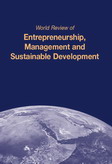Forthcoming Articles
World Review of Entrepreneurship, Management and Sustainable Development

There are currently no forthcoming papers for this journal.
Register for our alerting service, which notifies you by email when new issues are published online.